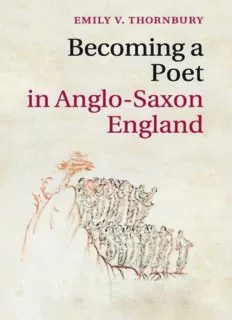
Becoming a Poet in Anglo-Saxon England PDF
Preview Becoming a Poet in Anglo-Saxon England
BECOMING A POET IN ANGLO-SAXON ENGLAND Combininghistorical,literaryandlinguisticevidencefromOldEnglish andLatin,BecomingaPoetinAnglo-SaxonEnglandcreatesanew,more complete picture of who and what pre-Conquest English poets really were.ItincludesastudyofAnglo-Saxonwordsfor‘poet’andthefirstlist of named poets in Anglo-Saxon England. Its survey of known poets identifies four social roles that poets often held – teachers, scribes, musiciansandcourtiers–and exploresthekindsofpoetrycreatedby theseindividuals.Thebookalsooffersanewmodelforunderstanding theroleofsocialgroupsinpoets’experience:itarguesthatthepresence or absence of a poetic community affected the work of Anglo-Saxon poets at all levels, from minute technical detail to the portrayal of character. This focus on poetic communities provides a new way to understandtheintersectionofhistoryandliteratureintheMiddleAges. emilyv.thornburyisanAssistantProfessorintheDepartmentof EnglishattheUniversityofCalifornia,Berkeley. CAMBRIDGE STUDIES IN MEDIEVAL LITERATURE GeneralEditor AlastairMinnis,YaleUniversity EditorialBoard ZygmuntG.Barański,UniversityofCambridge ChristopherC.Baswell,BarnardCollegeandColumbiaUniversity JohnBurrow,UniversityofBristol MaryCarruthers,NewYorkUniversity RitaCopeland,UniversityofPennsylvania RobertaFrank,YaleUniversity SimonGaunt,King’sCollege,London StevenKruger,CityUniversityofNewYork NigelPalmer,UniversityofOxford WinthropWetherbee,CornellUniversity JocelynWogan-Browne,FordhamUniversity Thisseriesofcriticalbooksseekstocoverthewholeareaofliteraturewritteninthe major medieval languages – the main European vernaculars, and medieval Latin and Greek – during the period c. 1100–1500. Its chief aim is to publish and stimulate fresh scholarship and criticism on medieval literature, special emphasis beingplacedonunderstandingmajorworksofpoetry,prose,anddramainrelation tothecontemporarycultureandlearningwhichfosteredthem. Recenttitlesintheseries KatharineBreenImagininganEnglishReadingPublic,1150–1400 AntonyJ.HaslerCourtPoetryinLateMedievalEnglandandScotland: AllegoriesofAuthority ShannonGaykImage,Text,andReligiousReforminFifteenth-CenturyEngland LisaH.CooperArtisansandNarrativeCraftinLate-MedievalEngland AlisonCornishVernacularTranslationinDante’sItaly:IlliterateLiterature JaneGilbertLivingDeathinMedievalFrenchandEnglishLiterature JessicaRosenfeldEthicsandEnjoymentinLateMedievalPoetry:LoveAfterAristotle MichaelVanDussenFromEnglandtoBohemia:Heresy andCommunicationintheLaterMiddleAges MartinEisnerBoccaccioandtheInventionofItalianLiteraryCulture:Dante, Petrarch,Cavalcanti,andtheAuthorityoftheVernacular EmilyV.ThornburyBecomingaPoetinAnglo-SaxonEngland Acompletelistoftitlesintheseriescanbefoundattheendofthevolume. BECOMING A POET IN ANGLO-SAXON ENGLAND EMILY V. THORNBURY UniversityPrintingHouse,Cambridgecb28bs,UnitedKingdom PublishedintheUnitedStatesofAmericabyCambridgeUniversityPress,NewYork CambridgeUniversityPressispartoftheUniversityofCambridge. ItfurtherstheUniversity’smissionbydisseminatingknowledgeinthepursuitof education,learning,andresearchatthehighestinternationallevelsofexcellence. www.cambridge.org Informationonthistitle:www.cambridge.org/9781107051980 ©EmilyV.Thornbury2014 Thispublicationisincopyright.Subjecttostatutoryexception andtotheprovisionsofrelevantcollectivelicensingagreements, noreproductionofanypartmaytakeplacewithoutthewritten permissionofCambridgeUniversityPress. Firstpublished2014 PrintedintheUnitedKingdombyClays,StIvesplc AcataloguerecordforthispublicationisavailablefromtheBritishLibrary LibraryofCongressCataloguinginPublicationdata Thornbury,EmilyVictoria,1977– BecomingapoetinAnglo-SaxonEngland/EmilyVictoriaThornbury. pages cm.–(Cambridgestudiesinmedievalliterature) isbn978-1-107-05198-0(hardback) 1. Englishpoetry–OldEnglish,ca.450–1100–Historyandcriticism. 2. Literatureandsociety–England–History–To1500. I. Title. pr203.t46 2013 8290.1009–dc23 2013026730 isbn978-1-107-05198-0Hardback CambridgeUniversityPresshasnoresponsibilityforthepersistenceoraccuracyof URLsforexternalorthird-partyinternetwebsitesreferredtointhispublication, anddoesnotguaranteethatanycontentonsuchwebsitesis,orwillremain, accurateorappropriate. Contents Listoffiguresandtables pagevi Acknowledgements viii Abbreviations x Introduction:HowcanweknowaboutAnglo-Saxonpoets? 1 1 Whatwasapoet? 11 2 Whobecamepoets? 37 3 Thepoetinthecommunity 95 4 Thepoetalone 161 5 Spectralcommunities 199 Afterword:Awayofhappening 239 AppendixI AhandlistofnamedauthorsofOldEnglish orLatinverseinAnglo-SaxonEngland 243 AppendixII SkaldsworkinginAnglo-SaxonEngland 248 Notes 250 Bibliography 290 Index 316 v Figures and tables Figures 3.1 MapofCanterburyalumni page 140 3.2 Ecclesiasticalconnectionsinseventh-centuryEngland: theCanterburyschool 141 3.3 Schoolnetworks(Malmesbury,Wearmouth-Jarrow) 144 3.4 Aldhelm’sIrishconnections 150 3.5 Aldhelm’sroyalconnections 151 3.6 Octosyllabicexchangesinseventh-centuryEngland 155 4.1 AlliterativepreferencesinJuliana 166 4.2 AlliterativepreferencesinGuthlacA 166 4.3 AlliterativepreferencesinChristIII 167 4.4 AlliterativepreferencesinChristandSatan 169 4.5 AlliterativepreferencesinChristandSatan,includingaverage 170 Tables 1.1 Anglo-Saxonwordsfor‘poet’ 21 1.2 OldEnglishwordsfor‘poet’ 21 1.3 Referentsofscopanditscompounds 23 1.4 Referentsofwordsfor‘poet’inAnglo-Latin 27 2.1 TheAnglo-Saxon‘corecurriculum’:versetexts 47 2.2 Twoeleventh-centurycollectionsofAnglo-Latinriddles 53 4.1 AlliterativepreferencesaspercentagesinJuliana 165 4.2 AlliterativepreferencesaspercentagesinGuthlacA 165 4.3 AlliterativepreferencesaspercentagesinChristIII 165 vi Listoffiguresandtables vii 4.4 Expectedchancepercentagesofstressedinitialletters 168 4.5 AlliterativepreferencesaspercentagesinChristandSatan 168 4.6 Versesinham 175 4.7 Typesofhamformulas 176 4.8 Poeticpassiveinfinitivesin–ierinAldhelmandBede 194 5.1 ManuscriptscontaininglateSouthernverse 226 Acknowledgements Without the support (and judgment) of a number of communities, this would have been an infinitely poorer book. The idea and research for Becoming a Poet began at the University of Cambridge, and I would like firsttothankRosalindLove,whosupervisedmydoctoralwork,andAndy Orchard, under whose auspices I was admitted as a postgraduate student. Given that I turned up knowing nothing whatever about Anglo-Latin, I have continual reason to be grateful to their generosity and insight. I would also like to thank the other members of the Department of Anglo-Saxon, Norse and Celtic – especially Richard Dance – for their support during my time at Cambridge. Much of the primary research for Chapters2and4ofthisbookwasundertakenwhileIwasaJuniorResearch Fellow at Churchill College, Cambridge: my thanks to the Master and Fellows of the College for the opportunity to pursue my work in such a vibrantsetting.Andwhilethelitanyoffriends,colleagues,co-conspirators, etc.thatshaped mytime inCambridgeistoolongforafulltranscription, I’d particularly like to acknowledge two sets. First, my fellow ASNCs: especially including Aaron Kleist, Chris Abram, Claudia Di Sciacca, Flora Spiegel, Leslie Lockett (ASNC honoris causa), Manish Sharma, Rebecca Rushforth, and the many undergraduates who survived my tutelage (and wentontogreatthingsdespiteit),especiallyErikNibleus.Likewise,I’dlike to thank Paul Szarmach for the opportunity to work at successive NEH SummerSeminars:itwasawonderful(ifoccasionallyperilous)experience, and gave me the chance to get to know many great colleagues, including Jacqueline Stodnick, Martin Foys, Rebecca Stephenson, Renée Trilling, Robin Norris, and Samantha Zacher. The Kalamazoo/Notre Dame nexus also put me in touch with Miranda Wilcox, who has been exceptionally generousinsharingherunpublishedwork. Berkeley’s English Department is a truly extraordinary place to pursue anykindofintellectualproject–butespeciallyafirstbook.Ishouldliketo thanktheuniversityforitsgeneroussupportofmyresearchviaaFellowship viii
Description: